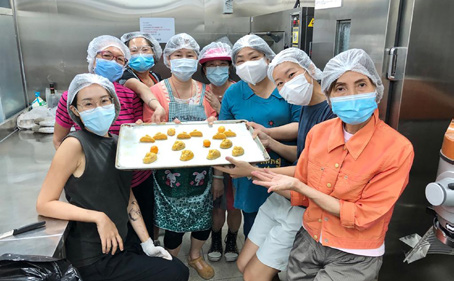Over the years, mooncakes and turnip cakes have been winning over the love and loyalty of the locals in Tin Shui Wai, in Northwest Hong Kong. Made with local eco-friendly ingredients by local women through the organisation Tin Zi Zok Wai, the food contains care from the people, the community, and the land.

In this Tin Zi Zok Wai project, grassroots women
make and sell healthy mooncakes to the community.
Local Women, Local Living
Life in Tin Shui Wai is characterised by a lack of social protection and many large businesses controlling the supply of goods and services. Local jobs are scarce, and travel costs hefty for people who seek employment elsewhere. With the mission of improving local people’s livelihoods, Concern for Grassroots Livelihood Alliance was set up in 2011, and Tin Zi Zok Wai was established in the following year to explore alternative ecological and economic systems with local women.
Tin Zi Zok Wai’s eco-farm has been a happy community hub–members follow eco-friendly farming methods and sell their produce in a co-purchase network and at the Tin Shui Wai market. They also serve as docents, explaining the value and different approaches to organic farming with consumers at the farm or the market. Devoting their skills and labour, they earn community currency to exchange for food and essential items. As the farm’s produce is grown and processed locally, Tin Shui Wai locals taste pride and comfort as well as freshness and health. They are also experiencing a change in identity, from pure consumers to producers, and feeling a new sense of opportunity and imagination in their community.
Core members acknowledge how Tin Zi Zok Wai has promoted equal participation and strengthened community relationships. Both local women and staff say they have more confidence and independence now that they are earning wages as food producers and instructors, kick-starting community groups, making friends, exchanging tips, or engaging in advocacy on issues such as markets and agricultural policies.
Until recently, the working groups–farming, food processing, guided tours, sales, and more–have been run by more than ten core members, but there’s been a move towards self-governance. The Tin Zi Zok Wai team has been keen to develop more ways to connect community economy, local people, and the land. In this context, PCD began to partner with Tin Zi Zok Wai in 2020 to deepen members’ understanding on community economy through practices such as community markets, Community-Supported Agriculture, rural-urban guided tours, and local food. Members have been participating in a series of workshops promoting community co-learning, while also enhancing the capacity of the local instructors. Some 20-40 members have been gaining leadership and practical skills at monthly co-learning activities on topics such as activity design and budgeting.

Women participating in the Tin Zi Zok Wai project
have prepared a range of homemade sauces.
They have increased their self-confidence and
won the praise of their Tin Shui Wai community.
Towards Independence and Sustainability
Since 2022, Tin Zi Zok Wai has been focusing on sustainability with its core members, both on the organisational and ecological front. Their new Sustainable Living Design Workshop Series embraces a holistic understanding of the concept, one that includes community economy, agriculture, and people- nature connections. Further, core members have taken the lead in planning the Diverse Community Economy Workshop Series, covering areas such as eco-farming, handicrafts and community-guided tours. The initiative supports Tin Shui Wai residents to contribute and develop their skills in service of the community.
Tin Shui Wai and Tin Zi Zok Wai have faced many challenges, internal and external, during the decade 2012 to 2022. Seeing the need to update their understanding of the community’s resources and needs, new and existing members began conducting participatory community research. The project included a small-grant component to support experimental community economy initiatives identified along the way. When the pandemic put a stop to activities, the team slowed down. Yet at the same time, they felt it was even more important to strengthen community relationships and resilience, continuing to play a supportive role in members’ journeys to sustainability and independence.
As we grow and learn with the land and our community, our stories become deeper and richer.

